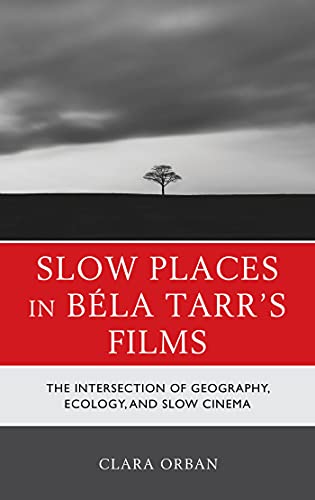 (DePaul University/Jeff Carrion)
(DePaul University/Jeff Carrion)Slow Places in Béla Tarr's Films: The Intersection of Geography, Ecology and Slow Cinema
By: Clara Orban, Department of Modern Languages
"Slow Places in Béla Tarr’s Films: The Intersection of Geography, Ecology, and Slow Cinema" examines Hungarian filmmaker Béla Tarr’s approach to creating geographies of indifference through slow cinema techniques. Through a close examination of his filmography, the author observes Tarr's interiors provide claustrophobic environments in which human relationships have difficulty flourishing, while his exteriors become landscapes through which characters wander endlessly. Furthermore, Tarr’s sparse use of animals provides contrast to the humans who inhabit these spaces, as they, too, are indifferent to humans’ fates. The book utilizes close readings of Tarr’s films—including his short films— along with relevant poems, a thorough filmography and an interview with Tarr about aspects of this book to aid in its analysis.

What’s the most surprising thing you learned while writing this book?
Besides deepening my understanding of Tarr's films, I learned more about slow cinema in general. I had already written an article on Michelangelo Antonioni's work and was surprised to learn he is considered one of the early directors to adopt this style. I then was able to explore Tarkovsky, Angelopoulos and other directors whose films I enjoyed immensely.
Persuade someone to read your book in less than 50 words:
If you love cinema and the power they have to persuade us and make us think, Tarr's films will move you. This book is geared even to those who don't know his work well, with a filmography and the poems that make up the narrative of one of his short films.
About the author:
Clara Orban is a professor of French and Italian at DePaul. She has published books, book chapters, articles and presented papers on surrealism, futurism, language pedagogy, AIDS literature, sports, TV and Italian film. She published her first novel, "Terra Firma," in 2006. Her sixth book, "Body [in] Parts," published in 2008, analyzes the Marquis de Sade’s influence on Hervé Guibert. She also is a certified sommelier and teaches a geography course on wine at DePaul.
Publisher and publication date:
Lexington Books, September 2021
Signed by the Author allows DePaul faculty and staff to introduce their recently published or upcoming book or chapter to the university community. To submit your book or chapter for consideration, contact Newsline.